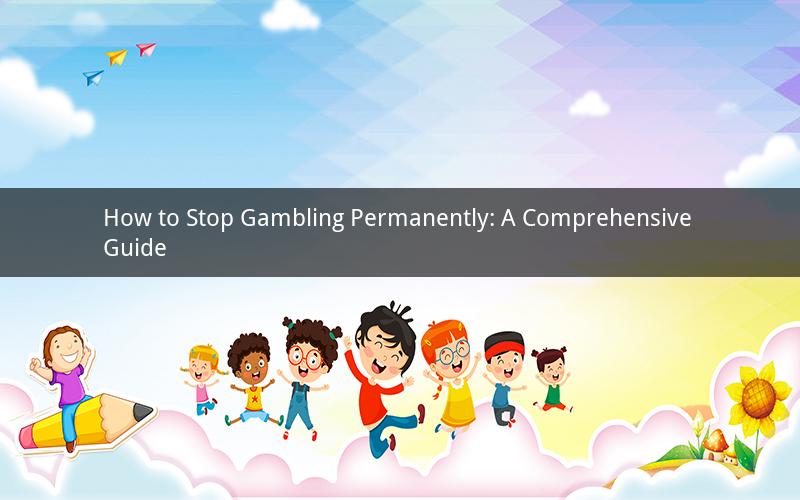
Introduction:
Gambling addiction is a serious issue that can have devastating consequences on an individual's life. Whether it's due to financial strain, relationship problems, or mental health issues, overcoming a gambling addiction is a challenging yet achievable goal. This article provides a comprehensive guide on how to stop gambling permanently, offering practical strategies and insights to help individuals on their journey to recovery.
1. Understanding the Problem:
To overcome a gambling addiction, it's crucial to first understand the problem. Recognize the signs of gambling addiction, such as the inability to control gambling behavior, preoccupation with gambling, and neglecting other responsibilities. Acknowledge that gambling addiction is a disease that requires treatment and support.
2. Seek Professional Help:
Seeking professional help is a vital step in overcoming a gambling addiction. Consult with a therapist or counselor specializing in addiction treatment. They can provide personalized guidance, therapy, and support throughout the recovery process. Additionally, consider joining a support group like Gamblers Anonymous, where individuals can share their experiences and receive encouragement from others facing similar challenges.
3. Develop a Recovery Plan:
Create a structured recovery plan tailored to your specific needs. This plan should include strategies to manage cravings, avoid triggers, and develop healthier habits. Some key components of a recovery plan include:
a. Setting Clear Goals: Establish clear, achievable goals to monitor your progress. These goals may include reducing the amount of money spent on gambling, avoiding certain gambling venues, or limiting the time spent on gambling activities.
b. Identifying Triggers: Identify the factors that trigger your urge to gamble, such as financial stress, social situations, or emotional distress. Develop coping mechanisms to address these triggers, such as engaging in alternative activities or seeking support from friends and family.
c. Developing Healthy Habits: Replace gambling with constructive and fulfilling activities. This may include hobbies, exercise, socializing, or engaging in self-care practices. Establish a routine that promotes a healthy lifestyle and reduces the temptation to gamble.
4. Financial Management:
Addressing the financial aspect of gambling addiction is crucial for long-term recovery. Consider the following strategies:
a. Budgeting: Create a realistic budget that accounts for essential expenses, savings, and entertainment. Stick to this budget to prevent overspending and falling back into old patterns.
b. Selling or Selling Off High-Value Items: If you have accumulated debt due to gambling, consider selling off valuable items to pay off your debts. This can help alleviate financial stress and prevent future gambling.
c. Seeking Financial Counseling: Consult with a financial counselor to develop a plan to manage your finances effectively and address any underlying financial issues.
5. Strengthening Support Systems:
Surround yourself with a supportive network of friends, family, and professionals who can provide encouragement and guidance throughout your recovery journey. Consider the following steps:
a. Open Communication: Communicate your struggles and recovery goals with trusted individuals in your life. Seek their understanding, support, and assistance when needed.
b. Building a Supportive Community: Join online forums, support groups, or local communities dedicated to helping individuals overcome gambling addiction. Connect with others who share similar experiences and offer mutual support.
c. Seeking Guidance from Loved Ones: Lean on friends and family members who can offer emotional support, hold you accountable, and remind you of your commitment to recovery.
6. Mindfulness and Self-Reflection:
Develop mindfulness and self-reflection practices to gain insight into your gambling addiction and prevent relapse. Consider the following techniques:
a. Meditation: Practice meditation to cultivate a sense of calm, focus, and self-awareness. This can help you recognize and manage cravings and triggers.
b. Journaling: Keep a journal to reflect on your thoughts, feelings, and experiences related to gambling. This can provide valuable insights into your addiction and help you identify patterns or triggers.
c. Mindfulness Training: Attend mindfulness workshops or seek guidance from a mindfulness instructor to develop mindfulness skills and apply them to your daily life.
7. Continuing Education and Support:
Recovery from a gambling addiction is an ongoing process. Stay committed to your journey by continuing to educate yourself about addiction and seeking support when needed. Consider the following steps:
a. Attend Workshops or Seminars: Attend workshops, seminars, or lectures on addiction, gambling, and recovery to gain new insights and expand your knowledge.
b. Follow Industry News: Stay informed about the latest research, treatment methods, and resources related to gambling addiction. This can help you stay motivated and adapt your recovery plan as needed.
c. Regular Check-ins with Professionals: Schedule regular check-ins with your therapist or counselor to discuss your progress, address any challenges, and make adjustments to your recovery plan if necessary.
Questions and Answers:
Q1: How can I identify if I have a gambling addiction?
A1: Look for signs such as the inability to control gambling behavior, preoccupation with gambling, neglecting responsibilities, and experiencing negative consequences due to gambling.
Q2: Can I overcome a gambling addiction on my own?
A2: While it is possible to overcome a gambling addiction without professional help, seeking support from therapists, counselors, and support groups can significantly increase your chances of long-term recovery.
Q3: What are some effective coping mechanisms to deal with gambling triggers?
A3: Coping mechanisms may include engaging in alternative activities, practicing mindfulness, seeking support from loved ones, and developing healthy habits.
Q4: How can I manage my finances during recovery from a gambling addiction?
A4: Develop a budget, consider selling off high-value items to pay off debts, seek financial counseling, and implement strategies to prevent overspending.
Q5: Is it possible to completely stop gambling after overcoming an addiction?
A5: Yes, it is possible to completely stop gambling after overcoming an addiction. Recovery is an ongoing process, and with commitment, support, and effective strategies, individuals can maintain long-term sobriety.